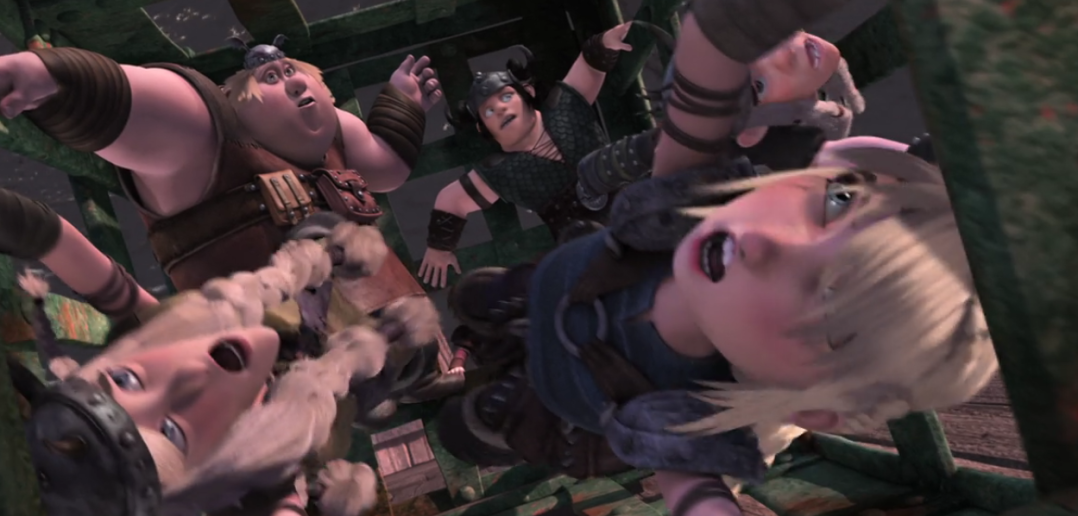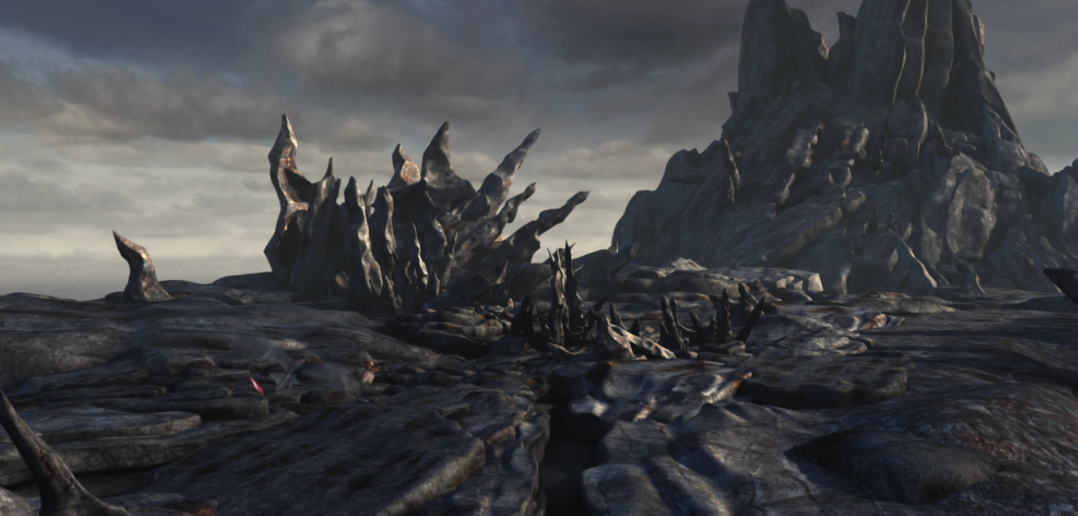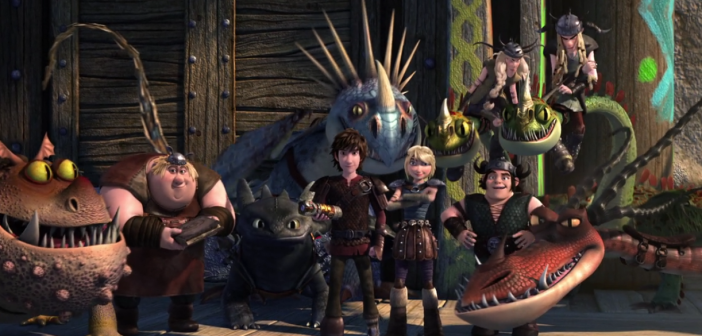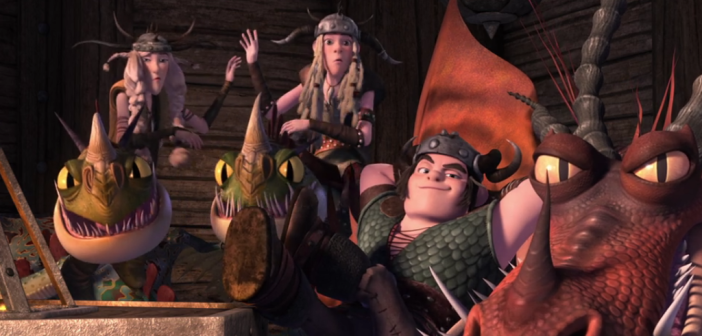The 8 Biggest Frustrations With DreamWorks’ Dragons Series
5. The Characters, Specifically, Are Wildly Unlikable…
Okay, so we need to slow down a bit, and discuss how every character outside of Hiccup is pretty terribly handled. Ostensibly, Snotlout, Fishlegs, Tuffnut, and Ruffnut are all four variations of the same comic relief character trope (Snotlout = dumb, arrogant jock who falls down a lot; Fishlegs = nerdy, whiny scaredy-cat who falls down a lot; Tuffnut and Ruffnut = gross, psychopathic twins who fall down a lot, but on purpose). Astrid only stands out because she’s a girl – specifically, the kind of strong female character that we’re completely done with in TV these days.
Calling them “unlikable” may be the wrong word. I think it would be more accurate to call them “unsympathetic.” It’s difficult to connect to these characters, to understand their slow growth into adulthood or their endearing interest in the world around them. There’s an episode in the Riders season called “Thawfest,” for example, where it’s revealed that Snotlout’s family is driven by sense of pride so resolute that it’s pretty heavily implied that Snotlout’s father would respond to any large-scaled disappointment from his son with some kind of neglect or abuse. It’s a pretty shocking, uncomfortable moment, and arguably the most intriguing moment of the series – the How to Train Your Dragon films certainly don’t shy from hard-hitting drama. Yet not only does the episode totally downplay this implication with an easy ending, it’s never brought up again. Every and all opportunities to examine what makes the bullying, buffoonish character click as a human is otherwise ignored. But at least Snotlout was given a parent; the other characters I assume were simply willed into existence.
6. … and Are Completely Useless Without Hiccup
 I think that my number one narrative pet peeve is when a team or group of people are rendered pretty much ineffective or useless without the leader. There’s something… lazy about that, bordering on offensive, when potentially rich, individual characters can’t function on their own without their leader guiding them or teaching them or telling them how to swallow food. So if you were wondering what to expect if you ever decided to try this series out, expect a whole lot of judgmental looks from Hiccup while telling everyone how to do every single thing correctly.
I think that my number one narrative pet peeve is when a team or group of people are rendered pretty much ineffective or useless without the leader. There’s something… lazy about that, bordering on offensive, when potentially rich, individual characters can’t function on their own without their leader guiding them or teaching them or telling them how to swallow food. So if you were wondering what to expect if you ever decided to try this series out, expect a whole lot of judgmental looks from Hiccup while telling everyone how to do every single thing correctly.
The very first episode of “Race to the Edge” ends with a cliffhanger in which everyone but Hiccup and Toothless are trapped in a cage while a ship is sinking. Isolated from everything else, this wouldn’t be a problem. But in relation to two past seasons which amounts to Hiccup just teaching everyone to pay attention and the various methods to train, then defend against, dragons all the time, it’s representative of the kind of approach to the cast that the writers seem to truly believe – which includes: Hiccup teaching all the lessons, Hiccup telling everyone what to do, Hiccup constantly saving the day, and Hiccup having all Shelock Holmes-esque “I know what we have to do!” ideas. I’m not even sure why Hiccup is even hanging around these useless failures.
7. The Sense of Freedom and Wonder is Bland and Boring
 I guess I’d be okay with such inane, one-note characters and the show’s overall absolute worship of the cult of Hiccup if the broader, overall thrust of the series – the exploration and development of the various dragons and the lands outside of Berk – were, in any way, interesting. Yet it feels like the show goes out of its way to make it the most boring thing in existence. I talked about this somewhat in the fourth section but I need to emphasize this, because in the end, the films managed to produce this sense of wonder and awe: the first, in the relative quiet interactions between boy and dragon, and the slow revelation of the dragons’ plight, and the second, in the discovery of Hiccup’s mom and her majestic world that hosted a hidden realm of the magnificent winged beasts. Regardless of my criticisms, it is that sense of freedom and discovery that made those films work.
I guess I’d be okay with such inane, one-note characters and the show’s overall absolute worship of the cult of Hiccup if the broader, overall thrust of the series – the exploration and development of the various dragons and the lands outside of Berk – were, in any way, interesting. Yet it feels like the show goes out of its way to make it the most boring thing in existence. I talked about this somewhat in the fourth section but I need to emphasize this, because in the end, the films managed to produce this sense of wonder and awe: the first, in the relative quiet interactions between boy and dragon, and the slow revelation of the dragons’ plight, and the second, in the discovery of Hiccup’s mom and her majestic world that hosted a hidden realm of the magnificent winged beasts. Regardless of my criticisms, it is that sense of freedom and discovery that made those films work.
That’s what completely lacking in the series. I understand the lack of budget and time constraints, but even at the smaller, episodic scale, there’s very little that happens that feels like a marvel. There’s no sense that as these kids discover new things about the lands and dragons… and themselves… that it means something, that it’s an eye-opener or a significant revelation. The show approaches its discoveries like fetch-quests, like checking off answers to a Q&A session then letting its characters bask in every new, dangerous, marvelous venture. There’s no dramatic poignancy to their grand mission; it’s about as wondrous as watching them pay taxes.
8. The Actual Stories and Plotting Elements Are Just Not Good At All
 Bland locales and weak characters are one thing, but at the very least, you could relatively ignore those shortcomings by presenting a solid twenty-three minutes of good, strong storytelling – you know, a beginning, a middle, and an end, with rising action and mystery and stakes. But alas, save for the rare episode here and there, the plotting is middling at best, with low stakes, dumb character decisions, and baffling developments that deflect any chance of a genuinely interesting story.
Bland locales and weak characters are one thing, but at the very least, you could relatively ignore those shortcomings by presenting a solid twenty-three minutes of good, strong storytelling – you know, a beginning, a middle, and an end, with rising action and mystery and stakes. But alas, save for the rare episode here and there, the plotting is middling at best, with low stakes, dumb character decisions, and baffling developments that deflect any chance of a genuinely interesting story.
This essentially makes all encounters with hostile dragons and/or vicious exiled Vikings completely perfunctory, with little purpose behind story developments. Potential dramatic beats are actively rendered moot, like when Heather, a confused, vengeful girl that joins Hiccup and his team and discovers the one person she wants to kill out of revenge is her brother. It’s a shocking reveal… but then she leaves, giving the audience no opportunity to experience the fallout of that revelation. In the second part of the pilot episode for Race to the Edge, the crew goes up against a white dragon in a wintry setting, desperately trying to figure out how the dragon maneuvers so well in a snow storm. For some reason, about one minute before they (hahaha, it’s Hiccup) figures it out, the episode shows the POV of the dragon, a la the Predator. It couldn’t let the characters just discover that the dragon senses body heat at the same time as the audience, nor does it use the dragon’s POV throughout the episode as an aesthetic decision to increase tension (like that climax in Predator). It’s just there at that one scene, a completely superfluous moment that represents the entire superfluous nature of the series itself.
“This changes everything.” Yeah – it almost manages to completely change my opinion on the first film.
Previously by Kevin Johnson
7 Hard-Hitting Questions We Have For Nick’s New ALVINNN!!! and the Chipmunks
8 Actual Positive Moments in Bojack Horseman’s Second Season
9 Random Things Kids’ Cartoons Use to Pass Off as Alcohol
4 Reason Why We Don’t Talk About The Disney Afternoon (and 4 Reasons Why We Should)

